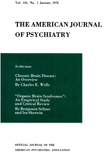THE PSYCHODYNAMICS OF THE "DRY DRUNK"
Abstract
Our study of the responses of the 52 respondents to the questionnaire on the dry drunk leads us to the following conclusions:
1. The dry drunk is experienced by the majority of alcoholics who have maintained sobriety over a long period.
2. The occupation of an alcoholic has no statistical significance in maintaining sobriety.
3. A number of alcoholics will drink from 10 to 20 years before they begin to maintain sobriety.
4. Dry drunks generally occur within the first year of sobriety ( occasionally during the early months).
5. This symptom occurs irregularly and with diminishing intensity as the period of sobriety lengthens.
6. The dry drunk is characterized by a feeling of deep depression and frustration and by indecision regarding taking a drink.
7. "Inner life" is largely responsible for precipitating a dry drunk.
8. The dry drunk often is preceded by the same feelings.
9. The principal feelings after a dry drunk are relief and thankfulness at not drinking during this period of craving.
10. Drugs are not used to combat the moods and feelings of a dry drunk nor to produce similar feelings.
11. Alcoholics are irritable, restless, and impatient during a dry drunk.
12. After a dry drunk one's thoughts, feelings, and behavior return to normal.
13. A. A. members are the persons most helpful during a dry drunk while spouses, other members of the family, and former drinking companions are the least helpful.
14. Dry drunks may be prevented by contacts with A. A. and efforts to keep the mind off the drinking problem.
15. Dry drunks are generally related to one's mood swings
16. The financial status generally improves when sobriety is maintained over an extended period.
17. The dry drunks described by our respondents have a number of the same characteristics as the " late withdrawal symptoms" described by Wellman.
We feel that this study has been useful in clarifying our thinking on the dry drunk, in indicating sources of help for persons who are experiencing or may suffer dry drunks, and in pointing out areas for further study. We are impressed with the thoughtful, painstaking way in which the questionnaires were answered and with the willingness of the respondents to elaborate in detail on their experiences.
Access content
To read the fulltext, please use one of the options below to sign in or purchase access.- Personal login
- Institutional Login
- Sign in via OpenAthens
- Register for access
-
Please login/register if you wish to pair your device and check access availability.
Not a subscriber?
PsychiatryOnline subscription options offer access to the DSM-5 library, books, journals, CME, and patient resources. This all-in-one virtual library provides psychiatrists and mental health professionals with key resources for diagnosis, treatment, research, and professional development.
Need more help? PsychiatryOnline Customer Service may be reached by emailing [email protected] or by calling 800-368-5777 (in the U.S.) or 703-907-7322 (outside the U.S.).



